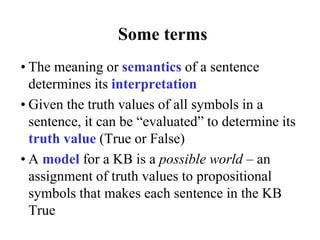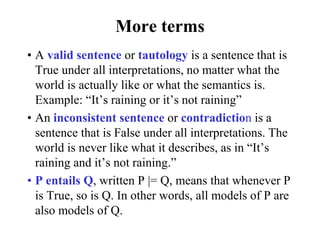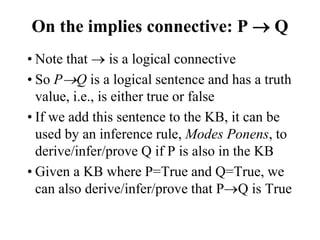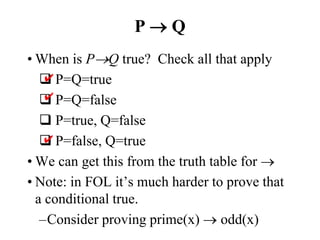10a.ppt
- 1. Propositional and First-Order Logic Chapter 7.4─7.8, 8.1─8.3, 8.5 Some material adopted from notes by Andreas Geyer-Schulz and Chuck Dyer
- 2. Logic roadmap overview • Propositional logic (review) • Problems with propositional logic • First-order logic (review) – Properties, relations, functions, quantifiers, … – Terms, sentences, wffs, axioms, theories, proofs, … • Extensions to first-order logic • Logical agents – Reflex agents – Representing change: situation calculus, frame problem – Preferences on actions – Goal-based agents
- 3. Disclaimer “Logic, like whiskey, loses its beneficial effect when taken in too large quantities.” - Lord Dunsany
- 5. Big Ideas • Logic is a great knowledge representation language for many AI problems • Propositional logic is the simple foundation and fine for some AI problems • First order logic (FOL) is much more expressive as a KR language and more commonly used in AI • There are many variations: horn logic, higher order logic, three-valued logic, probabilistic logics, etc.
- 6. Propositional logic • Logical constants: true, false • Propositional symbols: P, Q,... (atomic sentences) • Wrapping parentheses: ( … ) • Sentences are combined by connectives: and [conjunction] or [disjunction] implies [implication / conditional] is equivalent[biconditional] not [negation] • Literal: atomic sentence or negated atomic sentence P, P
- 7. Examples of PL sentences • (P Q) R “If it is hot and humid, then it is raining” • Q P “If it is humid, then it is hot” • Q “It is humid.” • We’re free to choose better symbols, btw: Ho = “It is hot” Hu = “It is humid” R = “It is raining”
- 8. Propositional logic (PL) • Simple language for showing key ideas and definitions • User defines set of propositional symbols, like P and Q • User defines semantics of each propositional symbol: – P means “It is hot”, Q means “It is humid”, etc. • A sentence (well formed formula) is defined as follows: – A symbol is a sentence – If S is a sentence, then S is a sentence – If S is a sentence, then (S) is a sentence – If S and T are sentences, then (S T), (S T), (S T), and (S ↔ T) are sentences – A sentence results from a finite number of applications of the rules
- 9. Some terms • The meaning or semantics of a sentence determines its interpretation • Given the truth values of all symbols in a sentence, it can be “evaluated” to determine its truth value (True or False) • A model for a KB is a possible world – an assignment of truth values to propositional symbols that makes each sentence in the KB True
- 10. Model for a KB • Let the KB be [PQR, Q P] • What are the possible models? Consider all possible assignments of T|F to P, Q and R and check truth tables – FFF: OK – FFT: OK – FTF: NO – FTT: NO – TFF: OK – TFT: OK – TTF: NO – TTT: OK • If KB is [PQR, Q P, Q], then the only model is TTT P: it’s hot Q: it’s humid R: it’s raining
- 11. More terms • A valid sentence or tautology is a sentence that is True under all interpretations, no matter what the world is actually like or what the semantics is. Example: “It’s raining or it’s not raining” • An inconsistent sentence or contradiction is a sentence that is False under all interpretations. The world is never like what it describes, as in “It’s raining and it’s not raining.” • P entails Q, written P |= Q, means that whenever P is True, so is Q. In other words, all models of P are also models of Q.
- 12. Truth tables Truth tables for the five logical connectives Example of a truth table used for a complex sentence • Truth tables are used to define logical connectives • and to determine when a complex sentence is true given the values of the symbols in it
- 13. On the implies connective: P Q • Note that is a logical connective • So PQ is a logical sentence and has a truth value, i.e., is either true or false • If we add this sentence to the KB, it can be used by an inference rule, Modes Ponens, to derive/infer/prove Q if P is also in the KB • Given a KB where P=True and Q=True, we can also derive/infer/prove that PQ is True
- 14. P Q • When is PQ true? Check all that apply P=Q=true P=Q=false P=true, Q=false P=false, Q=true
- 15. P Q • When is PQ true? Check all that apply P=Q=true P=Q=false P=true, Q=false P=false, Q=true • We can get this from the truth table for • Note: in FOL it’s much harder to prove that a conditional true. –Consider proving prime(x) odd(x) ✔ ✔ ✔
- 16. Inference rules • Logical inference creates new sentences that logically follow from a set of sentences (KB) • An inference rule is sound if every sentence X it produces when operating on a KB logically follows from the KB –i.e., inference rule creates no contradictions • An inference rule is complete if it can produce every expression that logically follows from (is entailed by) the KB. –Note analogy to complete search algorithms
- 17. Sound rules of inference • Here are some examples of sound rules of inference • Each can be shown to be sound using a truth table RULE PREMISE CONCLUSION Modus Ponens A, A B B And Introduction A, B A B And EliminationA B A Double Negation A A Unit Resolution A B, B A Resolution A B, B C A C
- 18. Soundness of modus ponens A B A → B OK? True True True True False False False True True False False True
- 19. Resolution • Resolution is a valid inference rule producing a new clause implied by two clauses containing complementary literals – A literal is an atomic symbol or its negation, i.e., P, ~P • Amazingly, this is the only interference rule you need to build a sound and complete theorem prover – Based on proof by contradiction and usually called resolution refutation • The resolution rule was discovered by Alan Robinson (CS, U. of Syracuse) in the mid 60s
- 20. Resolution • A KB is actually a set of sentences all of which are true, i.e., a conjunction of sentences. • To use resolution, put KB into conjunctive normal form (CNF), where each sentence written as a disjunc- tion of (one or more) literals Example • KB: [PQ , QRS] • KB in CNF: [~PQ , ~QR , ~QS] • Resolve KB(1) and KB(2) producing: ~PR (i.e., PR) • Resolve KB(1) and KB(3) producing: ~PS (i.e., PS) • New KB: [~PQ , ~Q~R~S , ~PR , ~PS] Tautologies (AB)↔(~AB) (A(BC)) ↔(AB)(AC)
- 21. Soundness of the resolution inference rule From the rightmost three columns of this truth table, we can see that (α β) (β γ) ↔ (α γ) is valid (i.e., always true regardless of the truth values assigned to α, β and γ
- 22. Proving things • A proof is a sequence of sentences, where each is a premise or is derived from earlier sentences in the proof by an inference rule • The last sentence is the theorem (also called goal or query) that we want to prove • Example for the “weather problem” 1 Hu premise “It’s humid” 2 HuHo premise “If it’s humid, it’s hot” 3 Ho modus ponens(1,2) “It’s hot” 4 (HoHu)R premise “If it’s hot & humid, it’s raining” 5 HoHu and introduction(1,3) “It’s hot and humid” 6 R modus ponens(4,5) “It’s raining”
- 23. Horn sentences • A Horn sentence or Horn clause has the form: P1 P2 P3 ... Pn Qm where n>=0, m in{0,1} • Note: a conjunction of 0 or more symbols to left of and 0-1 symbols to right • Special cases: – n=0, m=1: P (assert P is true) – n>0, m=0: PQ (constraint: both P and Q can’t be true) – n=0, m=0: (well, there is nothing there!) • Put in CNF: each sentence is a disjunction of literals with at most one non-negative literal P1 P2 P3 ... Pn Q (P Q) = (P Q)
- 24. Significance of Horn logic • We can also have horn sentences in FOL • Reasoning with horn clauses is much simpler – Satisfiability of a propositional KB (i.e., finding values for a symbols that will make it true) is NP complete – Restricting KB to horn sentences, satisfiability is in P • For this reason, FOL Horn sentences are the basis for Prolog and Datalog • What Horn sentences give up are handling, in a general way, (1) negation and (2) disjunctions
- 25. Entailment and derivation • Entailment: KB |= Q –Q is entailed by KB (set sentences) iff there is no logically possible world where Q is false while all the sentences in KB are true –Or, stated positively, Q is entailed by KB iff the conclusion is true in every logically possible world in which all the premises in KB are true • Derivation: KB |- Q –We can derive Q from KB if there’s a proof consisting of a sequence of valid inference steps starting from the premises in KB and resulting in Q
- 26. Two important properties for inference Soundness: If KB |- Q then KB |= Q –If Q is derived from KB using a given set of rules of inference, then Q is entailed by KB –Hence, inference produces only real entailments, or any sentence that follows deductively from the premises is valid Completeness: If KB |= Q then KB |- Q –If Q is entailed by KB, then Q can be derived from KB using the rules of inference –Hence, inference produces all entailments, or all valid sentences can be proved from the premises
- 28. Propositional logic: pro and con • Advantages –Simple KR language sufficient for some problems –Lays the foundation for higher logics (e.g., FOL) –Reasoning is decidable, though NP complete, and efficient techniques exist for many problems • Disadvantages –Not expressive enough for most problems –Even when it is, it can very “un-concise”
- 29. PL is a weak KR language • Hard to identify “individuals” (e.g., Mary, 3) • Can’t directly talk about properties of individuals or relations between individuals (e.g., “Bill is tall”) • Generalizations, patterns, regularities can’t easily be represented (e.g., “all triangles have 3 sides”) • First-Order Logic (FOL) is expressive enough to represent this kind of information using relations, variables and quantifiers, e.g., • Every elephant is gray: x (elephant(x) → gray(x)) • There is a white alligator: x (alligator(X) ^ white(X))
- 30. PL Example • Consider the problem of representing the following information: –Every person is mortal. –Confucius is a person. –Confucius is mortal. • How can these sentences be represented so that we can infer the third sentence from the first two?
- 31. PL Example • In PL we have to create propositional symbols to stand for all or part of each sentence, e.g.: P = “person”; Q = “mortal”; R = “Confucius” • The above 3 sentences are represented as: P Q; R P; R Q • The 3rd sentence is entailed by the first two, but we need an explicit symbol, R, to represent an individual, Confucius, who is a member of the classes person and mortal • Representing other individuals requires introducing separate symbols for each, with some way to represent the fact that all individuals who are “people” are also “mortal”
- 32. Hunt the Wumpus domain • Some atomic propositions: S12 = There is a stench in cell (1,2) B34 = There is a breeze in cell (3,4) W22 = Wumpus is in cell (2,2) V11 = We’ve visited cell (1,1) OK11 = Cell (1,1) is safe. … • Some rules: (R1) S11 W11 W12 W21 (R2) S21 W11 W21 W22 W31 (R3) S12 W11 W12 W22 W13 (R4) S12 W13 W12 W22 W11 … • The lack of variables requires us to give similar rules for each cell!
- 33. After the third move We can prove that the Wumpus is in (1,3) using the four rules given. See R&N section 7.5
- 34. Proving W13 Apply MP with S11 and R1: W11 W12 W21 Apply And-Elimination to this, yielding 3 sentences: W11, W12, W21 Apply MP to ~S21 and R2, then apply And-elimination: W22, W21, W31 Apply MP to S12 and R4 to obtain: W13 W12 W22 W11 Apply Unit resolution on (W13 W12 W22 W11) and W11: W13 W12 W22 Apply Unit Resolution with (W13 W12 W22) and W22: W13 W12 Apply UR with (W13 W12) and W12: W13 QED
- 35. Propositional Wumpus hunter problems • Lack of variables prevents stating more general rules –We need a set of similar rules for each cell • Change of the KB over time is difficult to represent –Standard technique is to index facts with the time when they’re true –This means we have a separate KB for every time point
- 36. Propositional logic summary • Inference is the process of deriving new sentences from old – Sound inference derives true conclusions given true premises – Complete inference derives all true conclusions from a set of premises • A valid sentence is true in all worlds under all interpretations • If an implication sentence can be shown to be valid, then— given its premise—its consequent can be derived • Different logics make different commitments about what the world is made of and what kind of beliefs we can have • Propositional logic commits only to the existence of facts that may or may not be the case in the world being represented – Simple syntax and semantics suffices to illustrate the process of inference – Propositional logic can become impractical, even for very small worlds






![Propositional logic
• Logical constants: true, false
• Propositional symbols: P, Q,... (atomic sentences)
• Wrapping parentheses: ( … )
• Sentences are combined by connectives:
and [conjunction]
or [disjunction]
implies [implication / conditional]
is equivalent[biconditional]
not [negation]
• Literal: atomic sentence or negated atomic sentence
P, P](https://image.slidesharecdn.com/10a-231220122038-081ad283/85/10a-ppt-6-320.jpg)



![Model for a KB
• Let the KB be [PQR, Q P]
• What are the possible models? Consider all possible
assignments of T|F to P, Q and R and check truth tables
– FFF: OK
– FFT: OK
– FTF: NO
– FTT: NO
– TFF: OK
– TFT: OK
– TTF: NO
– TTT: OK
• If KB is [PQR, Q P, Q], then the only model is
TTT
P: it’s hot
Q: it’s humid
R: it’s raining](https://image.slidesharecdn.com/10a-231220122038-081ad283/85/10a-ppt-10-320.jpg)









![Resolution
• A KB is actually a set of sentences all of which are
true, i.e., a conjunction of sentences.
• To use resolution, put KB into conjunctive normal
form (CNF), where each sentence written as a disjunc-
tion of (one or more) literals
Example
• KB: [PQ , QRS]
• KB in CNF: [~PQ , ~QR , ~QS]
• Resolve KB(1) and KB(2) producing: ~PR (i.e., PR)
• Resolve KB(1) and KB(3) producing: ~PS (i.e., PS)
• New KB: [~PQ , ~Q~R~S , ~PR , ~PS]
Tautologies
(AB)↔(~AB)
(A(BC)) ↔(AB)(AC)](https://image.slidesharecdn.com/10a-231220122038-081ad283/85/10a-ppt-20-320.jpg)















